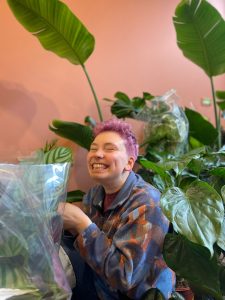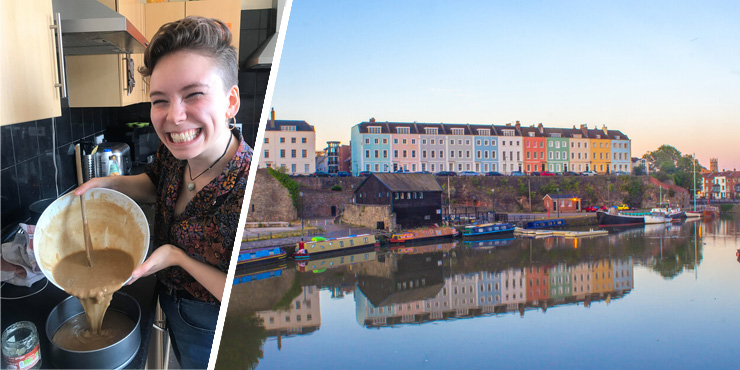Engineering and identity: Erin’s story
Erin Brady is a 4th Year Mechanical Engineering student who started their studies at the University of Bristol in 2018. They immediately fell in love with the city after visiting the top 10 UK universities listed by Which? University Guide as best for Mechanical or General Engineering. They plan to continue their academic pathway with a PhD in Engineering Education, to continue their work towards making education more accessible.
How would you describe your identity and what matters to you about how you are seen, heard and understood?
I am a neurodivergent, trans/non-binary queer person from a low income background.
My route to understanding concepts can be quite different from other people’s. During my upbringing I wasn’t really encouraged to become an engineer. I was always good at physics and maths but lacked spatial skills that I thought were needed. I now know that you don’t have to be a stereotypical inventor or be car-obsessed to be a good engineer.
What’s your area of focus and how did you end up here?
I love studying systems and processes but most of all, I value the importance of providing equitable access to education for anyone. I’ve been working on various outreach projects for nearly eight years and I’m glad to have been able to work on this while at university.
What are the key experiences that have shaped your journey to where you are now, who you are and what you do?
Progressing through the degree has helped me to rule out what I am not interested in and has highlighted some fascinating areas and industries. I feel much better informed about my career prospects and that there is something out there for me – someone who is not interested in working for one of the classic, big manufacturing companies in Bristol.
“You don’t have to be a stereotypical inventor or be car-obsessed to be a good engineer.”
Have you faced any challenges along the way, in terms of navigating or asserting your needs and rights? If so, how did you manage them, what helped and what hindered?
I came out as non-binary in 2020, while learning was still online. 2022-23 is the first academic year since then where all teaching for us has been in-person so I am still getting used to introducing my pronouns. I hope that any effort I make to do this, and highlight the importance of my identity in other ways, serves to improve trans visibility in the Engineering faculty and help other trans/non-binary people too.
This year was also the first in which I have accessed the University’s Disability Services. I was delighted by how fantastically helpful, responsive and supportive they have been. After arranging measures to make it easier for me to attend and learn in various ways, I was apprehensive about how my lecturers would respond to me needing this extra support but they have been very understanding.
What has your experience been like so far?
 During COVID, I ended up unable to work due to disabilities (which I was not entirely aware of at the time), stress and anxiety so had to suspend a year of study. Initially, I was unconfident in this decision as I wasn’t really talking to my tutors about it much. I was delighted to be so well supported when I returned to study in September 2021. It was quite a daunting decision to make, particularly as I was unsure of whether I would recover fully enough to learn properly, but it definitely paid off and really taught me to ensure that I have a life outside of university to help balance my needs and work.
During COVID, I ended up unable to work due to disabilities (which I was not entirely aware of at the time), stress and anxiety so had to suspend a year of study. Initially, I was unconfident in this decision as I wasn’t really talking to my tutors about it much. I was delighted to be so well supported when I returned to study in September 2021. It was quite a daunting decision to make, particularly as I was unsure of whether I would recover fully enough to learn properly, but it definitely paid off and really taught me to ensure that I have a life outside of university to help balance my needs and work.
As a city-based university, Bristol offers a lot of opportunities to engage with life outside of academics and this has really enriched my ability to grow more independent. Until the summer, I worked in a local plant shop run by other queer and disabled people who really helped me to feel valued and understood.
If there was anything you could change or would like to see changed, what might that be?
Despite engineering degrees having some of the highest proportions of neurodivergent students, there is little visibility for us. Learning and study spaces are very poorly designed. As an example, it is rare that I am in a lecture theatre or study room where I am able to completely focus. Often the shortage of quiet spaces and the ambience – lighting, noise level and temperature in particular – is distracting or causes migraines which can stop me from working for the rest of the day.
How do you balance work and life? What support have you received and is there anything more that you feel the University or Faculty could do?
Since returning to study, I have focused on taking plenty of breaks in the day. Lots of people feel they work their hardest when they spend long hours studying each day but this doesn’t work for me; I need to be careful not to burn out.
I have been talking to my personal and senior tutors about their techniques for managing stress too. There will always be difficulties with stress management due to the nature of the work we do as engineers and I think that this should be taught a little more in the first couple of years alongside study skills. University work is very different from pre-university learning, and study habits that worked before sometimes don’t seem to work as well now.
What advice would you have for your younger self, reflecting on your most notable life and work lessons?
Give yourself breathing space even at the most stressful times. For me, the time to recover after pushing through and burning out takes a few weeks, at least. With breaks, I can sustain my energy levels to keep working consistently throughout the year and I know this is valuable for future work too.


